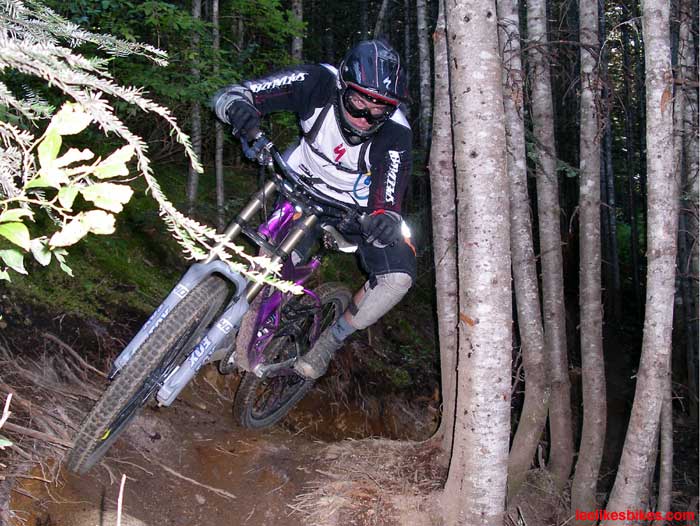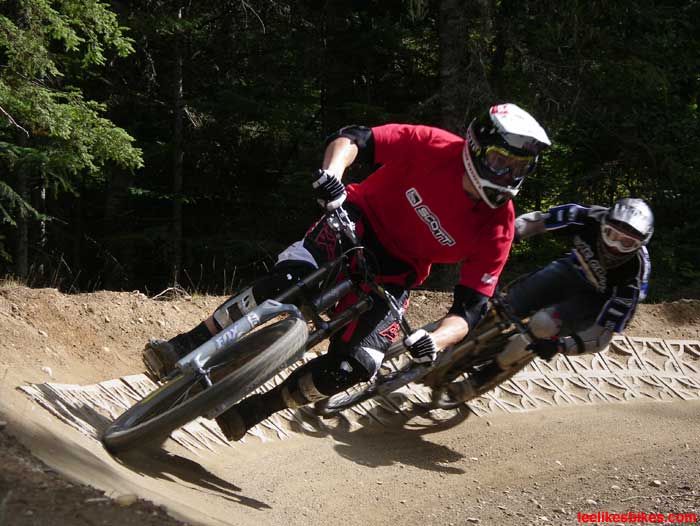Rider Safety Acts?
Lee,
I just read the “I want to build the next Whistler” entry and wanted to ask about liability with the ski resorts.
Colorado has laws that limit a ski resorts liability in case a skier gets hurt. Do these laws extend to mountain biking at the resort. From my understanding the ski industry would barely exist without the protection the ski resorts get from these limited liability laws. In order to promote growth of mountain biking maybe these laws should be amended to include cycling.
Nick
Hey Nick,
I just learned something. I thought the Colorado Skier Safety act applied to all activities on the mountain, but apparently it does not apply to summer operations. That’s probably why you sign a waiver to MTB at all resorts.
 Whistler treats mountain biking like skiing, and it’s working for them. Brandon Sloan style. |
Here’s an interesting article featuring Pete Webber of IMBA. Highlights:
– “Recreational Use Statutes provide a strong tool and are helping control the chilling effect of the threat of lawsuits on outdoor recreation,” Webber said. “Skier Safety Acts offer strong liability protections to ski resorts for their wintertime activities, but they don’t apply to summer sports.” Webber would like to see MTB legislation modeled after the ski laws.
– For some resorts, including Big Bear, the paltry revenue of MTB operations does not justify the risk. Mountain bikers are no longer allowed to ride on resort property. They ride the lift then descend on Forest Service roads.
– Liability concerns can actually benefit riders, because they force land managers to build quality trails and install thorough signage. Whistler is a good example here.
– “The most common lawsuits trail managers face are related to negligence, according to Webber. These lawsuits are based on the injured visitor claiming that a trail manager failed to design, construct, manage or maintain the trail with reasonable and prudent care, Webber said.”
– There have been very few mountain biker vs. resort lawsuits, and they haven’t had major nationwide effects. The fear of lawsuits — on the mountain as well as in society — is making resorts cautious.
 The better your trails, the lower your liability. That works out for Curtis Keene and Chris Herndon. A-Line at Whistler. |
– “The bike parks that are thriving have invested in top-quality trails and facilities, backed with a savvy business plan,” Webber said. “I think a key factor that drives bike park success is the quality of riding experience. There must be purpose-built all-weather trails designed and constructed by experienced professionals. Bike parks at ski resorts are doomed if they only offer ski trails, gravel service roads and eroded singletrack.”
– Waivers offer some protection for resorts, but how much depends on the state. Waivers are strongest in California and Colorado; they’re weakest in Arizona, Wisconsin and Connecticut.
– Summer liability issues are very similar to winter issues. Whistler, the most successful of the MTB resorts, has modeled its summer op after its winter op. Trail ratings, signs and instruction all make a better, safer experience.
– IMBA’s new book, “Managing Mountain Biking,” addresses many of these issues.
Lee’s opinion: To address the liability issue, resorts need to make mountain biking as much like skiing as possible. If we can get “Rider Safety Acts” that cover summer as well as winter, that’ll be a big help.

Comments are closed.